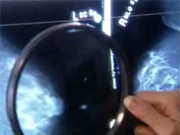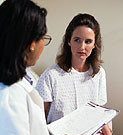Early Detection Still Key to Breast Cancer Survival
Despite advances in treatment, finding smaller tumors linked to better results
Young Cancer Survivors May Need Lifelong Screenings
Patients successfully treated at age 15 to 39 nearly 60 percent more likely to develop another cancer
Low Income, Minority Status Affect Medical Care Wait Times
Education also plays a role, with lower education levels associated with longer wait times
Ovarian Tissue Transplant Can Up Fertility Post Cancer Tx
Researchers in Denmark report a success rate of about 30 percent
CDC: Hospitals Doing Better Job of Promoting Breastfeeding
Still, nearly 4 million infants are born each year in U.S., but only 14% in 'baby-friendly' hospitals
Ultrasound Diagnosis of Fetal Teratoma Very Accurate
Very high sensitivity, low false-positives, but prognosis depends on location, size
Prognostic Disclosure Improves Life Expectancy Estimates
Prognostic disclosure linked to more realistic patient expectations in advanced cancer
3D Modeling Assists Evaluation of Complex Fetal Anatomy
New technology may help take guesswork out of high-risk pregnancy
Guidelines Developed for Managing Conflicts of Interest
Core principles developed for managing COIs during the clinical practice guideline development process
USPSTF Recommends CRC Screening for 50- to 75-Year-Olds
Grade A recommendation for 50- to 75-year-olds; individualized decision urged for those age 76 to 85



















